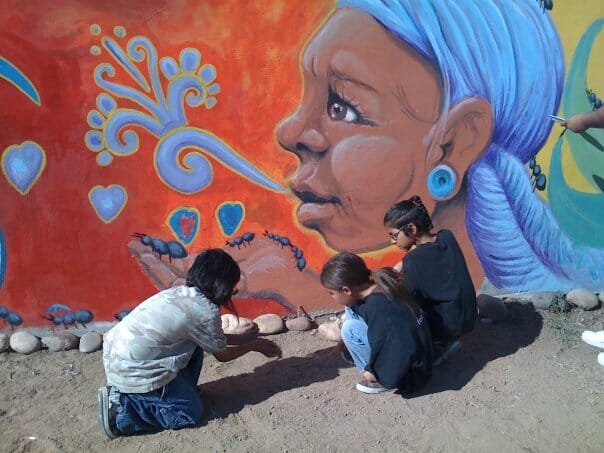Indigenous families have found a community in Arizona where they can embrace their roots, support other Indigenous communities, and get the help they need as migrants.
Tonatierra Nahuacalli is a cultural embassy of Indigenous peoples and an Indigenous rights nonprofit organization located in downtown Phoenix at 802 N. 7th St.
It is the only urban Indigenous center that is fully owned and operated by an Indigenous community where all its work is based on community needs, according to Tonatierra’s coordinator Eve Reyes-Aguirre.
READ ALSO: Why National Navajo Code Talkers Day declaration is so significant
About 20 families volunteer to help run the organization and have been working with the community for the past 25 years.
They support local, national, and global initiatives in the education, culture, and economic development of Indigenous communities.
Quetzal Co-Op, one of its oldest projects dating back to the 90s, started in Chiapas, Mexico with, the passing of the North American Free Trade Agreement and the effect that it was having on Indigenous populations in the South of Mexico.
The project buys and markets coffee from Indigenous communities in Mexico, Guatemala, Honduras, and El Salvador to help provide economic sustainability.
Reyes-Aguirre explained that all the funds that come in from sales go directly back into the project to keep reciprocating the purchasing of the coffee and other products in the South of Mexico.
In 2010 the organization expanded from purchasing coffee to handicrafts and other Indigenous products from artisans around the globe.
It sells these products in events or pop-ups around the Valley, except for the coffee products which can also be found on the website.
“We know big corporations like Starbucks go down there and buy for the minimal amount they can and make large exorbitated amounts of money here in the US,” Reyes-Aguirre said. “That’s probably why we aren’t super well known, we are not a huge million-dollar organization, we are just a humble organization that does this kind of work because it is the right thing to do especially for these communities.”
At Tonatierra they call it “just trade,” not just fair trade because it wants to pay at price or above the cost of what it takes these artisans and workers to create their products.
At the more local level, Tonatierra has several community-based projects such as the Macehualli project which focuses on defending the civil, human, and Indigenous rights of migrant day laborers and their families.
This past year from May to October, Tonatierra with its sister organizations was able to provide $30,000 in funding to various undocumented families who couldn’t receive any government aid during the COVID-19 pandemic.
Aside from providing housing, clothing, translators, and legal help for migrant families it also focuses on helping the community and youth increase their connection to their culture and knowledge of their ancestors.
The Xinachtli program, is another community-based project that has been running since the 90s designed to keep alive and pass on Indigenous Ancestral Knowledge to adults and youth.
It provides free workshops that focus on Indigenous languages, math, science, art, and gardening at their community center, in schools, and in the city parks.
Xochitl Venzor-Enrique, the youth project coordinator, has been part of the organization since she was a little kid. Her parents were founding members of Tonatierra.
She continues to work for the organization now as an adult because of the impact the community program had in her life.
“I want our youth to have access to their culture, to their ancestral languages, their foods, and ancestral knowledge,” Venzor-Enrique said. “This is why I work with the organization today; our youth are the future, they are the ones with the vision, and we must do whatever we can to support them, they are the future ancestors.”




